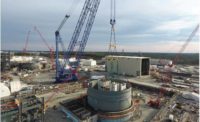Power Generation Fiasco
South Carolina Utilities Abandon Nuclear Reactor Project
Project opponents applaud after seeing billions spent on the work

Construction progressing in 2015 at SCE&G's V.C. Summer Nuclear Station, where two new Westinghouse AP1000s were being built.
Photo: Courtesy SCANA.
Four months after contractor Westinghouse Electric Co. filed for bankruptcy protection because of more than $6 billion in losses, the South Carolina utilities funding the V.C. Summer nuclear expansion project announced they are abandoning the project.
South Carolina Electric & Gas, a division of SCANA Corp., announced July 31 that it would be too expensive to complete the two units due to the uncertain availability of federal production tax credits and the amount of anticipated guarantee settlement payments from Toshiba Corp.
"Based on these factors, SCE&G concluded that it would not be in the best interest of its customers and other stakeholders to continue construction of the project," the utility stated.
According to SCE&G, Santee Cooper had indicated it would not consider the alternative of just completing one of the two units under construction.
The South Carolina Public Service Authority (Santee Cooper), which owns a 45% stake in the project, also separately announced its suspension of construction. According to SCE&G, Santee Cooper had indicated it would not consider the alternative of just completing one of the two units under construction.
According to Santee Cooper, "The decision to suspend construction is based in large part on a comprehensive analysis of detailed schedule and cost data, from both project contractor Westinghouse Electric Co. and subcontractor Fluor Corp., first revealed after Westinghouse filed for bankruptcy in March."
To date, Santee Cooper has spent approximately $4.7 billion in construction and interest for its share of the project. The utility stated, "The analysis shows the project would not be finished until 2024, four years after the most recent completion date provided by Westinghouse, and would end up costing Santee Cooper customers a total of $11.4 billion."
Final Project Construction Cost: $8 Billion
The utility's analysis, which assumed Westinghouse's rejection of its EPC contract in bankruptcy proceedings, pegged its own final costs for construction at $8 billion for construction and approximately $3.4 billion for interest.
"After Westinghouse's bankruptcy and anticipated rejection of the fixed-price contract, the best-case scenario shows this project would be several years late and 75% more than originally planned," said Lonnie Carter, Santee Cooper chief executive. "We simply cannot ask our customers to pay for a project that has become uneconomical. And even though suspending construction is the best option for them, we are disappointed that our contractor has failed to meet its obligations and put Santee Cooper and our customers in this situation."
"Generation diversity remains an important strategy for Santee Cooper, but the costs of these units are simply too much for our customers to bear," added Leighton Lord, chairman of the Santee Cooper board of directors.
With Santee Cooper pulling out from the project, SCANA had little choice but to go along, stated Chairman Kevin Marsh.
"Many factors outside our control have changed since inception of this project," Marsh said in a statement. "Chief among them, the bankruptcy of our primary construction contractor, Westinghouse, eliminated the benefits of the fixed-price contract to our customers, investors and other stakeholders.
"Ultimately," Marsh added, "our project co-owner Santee Cooper's decision to suspend construction made clear that proceeding on our own would not be economically feasible. Ceasing work on the project was our least desired option, but this is the right thing to do at this time." Also, SCE&G and SCANA could not justify completing just one unit without Santee Cooper's participation.
Just four days earlier, on July 27, SCE&G and SCANA had announced a definitive agreement with Toshiba Corp. for Toshiba to pay $2.168 billion to satisfy its guarantee of obligations under Westinghouse's engineering, procurement and construction contract. That announcement noted that the $2.168 billion is "payable regardless of whether both or either of the two nuclear units are completed, or the project is abandoned."
Opponents Applaud
Project opponents were pleased by the halting of work at V.C. Summer. Stephen Smith, executive director of the Southern Alliance for Clean Energy, Columbia, S.C., stated, "We applaud Santee Cooper and SCE&G for making the right decision to protect their customers. This project has been a multibillion-dollar disaster. We also call on Georgia Power and their utility partners to protect their customers from the similarly risky, mismanaged project in Georgia at Southern Company's Plant Vogtle."
In a statement from the Friends of the Earth, Tom Clements stated, "The decision to abandon the V.C. Summer project is of monumental proportion and is a full admission that pursuit of the project was a fool's mission right from the start. … To reduce the ongoing blow to SCE&G ratepayers already paying 18% of the bill just to pay for project financing, it's time for money to be refunded as it was collected from them under the false pretense that advance payment for the nuclear project was sound."
What Next for Georgia's Plant Vogtle?
The abandonment of the South Carolina project turns the spotlight to Georgia, where the future of Westinghouse's other big nuclear contract—a sister project at Plant Vogtle—remains undecided. In response to the V.C. Summer announcement, Georgia PSC Chairman Stan Wise issued a statement aimed at highlighting the "dissimilarities" of the two projects.
"First, the rate impact is spread across over three times as many customers at Georgia Power Company versus South Carolina Electric & Gas," Wise noted.
"Second, the overall rate impact of the Plant Vogtle expansion in Georgia of less than 5% thus far has been significantly lower than the current 18% residential customer impact reported by SCE&G," he added. "Third, the Toshiba parental guarantee, which reduces the total customer impact, is $3.7 billion for the Vogtle project versus $2.2 billion for the Summer project. Last, there are four co-owners underwriting the Georgia effort, whereas Santee Cooper is the only co-owner in South Carolina. These factors suggest the Plant Vogtle project may be in a better position to move forward than the project in South Carolina."
Wise added that he intends to seek a final decision from Georgia Power about the Vogtle project by the end of the year.





